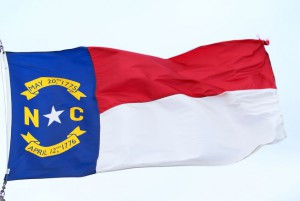North Carolina Democratic Convention Adds the Non-Religious to Its List of Protected Classes

They say that the way to change the world is to start in your own backyard. I recently had an opportunity to put that idea into action.
In my retirement, I have been fortunate to be able to devote my time and energy to advancing the cause of secularism and equal rights. One of the several organizations through which I work to accomplish this has been the Democratic Party. After working as a team leader in the 2012 Obama campaign, I was elected to one of the County Democratic Party vice chair offices and am now in my fourth year in this position. I have always been a delegate to the county and district conventions, but I had not been able to attend the state convention until this year. The North Carolina Democratic Convention was held on June 11, and I was pleased to attend as a district delegate.
While reviewing the 2016 Democratic Platform in preparation for the vote that would take place at the convention, I noticed a string of demographics named in relation to the section on civil rights. The section read as follows: “CIVIL RIGHTS: Racism, discrimination, hate, and bigotry still exist. Therefore, there is a need to continue to fight those who would take away the civil rights for which we fight so hard. Since many devoted their lives to social change, it is our obligation to demand civil rights for all people regardless of race, gender, gender identification, political persuasion, national origin, religion, age group and sexual orientation.”
The thought immediately occurred to me that if religion is included in this section, “no religion” should certainly be included, since those who claim no religious identification are the second largest “religious” demographic in NC, second only to evangelical Protestants. Luckily, the civil justice section of the platform was the first one brought to the floor, and I simply stepped to the microphone and proposed that the statement be amended to include “no religion.”
I had one minute to make my case. I stated the fact mentioned above and gave the national and state statistics (“Nones” make up 23 percent of the population nationally, 20 percent in North Carolina, and 35 percent of those under age 30, according to the Pew Research Center’s 2014 Religious Landscape Study). Then I pointed out that we secular, nonreligious citizens face discrimination. The NC State Constitution illegally names nontheism as the primary disqualifier for public office (“First, any person who shall deny the being of Almighty God”), implying that not being religious is more egregious than being convicted of treason and other felonies. The Nones are typically either overlooked or intentionally maligned, when we are actually the fastest growing “religious” demographic in NC, with a higher growth rate than any religious sect. I also pointed out that of the nonreligious population, nearly 50 percent are Democrats (the rest being split between Republicans and unaffiliated)!
Then I waited—somewhat breathlessly, I must admit—to see what the reaction would be. The first response was to suggest the wording be “religion or lack thereof.” Because the wording of the platform statement was already a bit awkward, using the noun “religion” and thus requiring the parallel construction, “no religion” or “non-religion,” rather than the adjective “religious” which would allow the more graceful “nonreligious,” to identify the demographics, I consented to the change. On reconsideration at this time, I prefer “no religion,” because “lack thereof” smacks slightly of deficiency to me, a point which I will make to the platform committee hopefully before the changes are finalized.
To my surprise, two more people rushed to the microphones to emphatically support my amendment. One stated he was a Christian, but he absolutely supported recognition of the nonreligious. A few others rushed up to me to thank me for speaking out for secular people, one young man with discernible emotion. No one spoke against my amendment, although one person inquired for the source of my statistics. The amendment passed with overwhelming support!
Additionally, a resolution was passed that “the members of the North Carolina Democratic Party shall respect individuals’ beliefs through a moment of silence,” as opposed to the “invocation” that’s normally included on the agenda for official state party business. The moment of silence, although completely unnecessary for a political or governmental assembly in my opinion, is still a vast improvement, considering that many precincts and counties begin their Democratic Party meetings with prayer, a practice that drives away many in our secular community.
To see local community support and recognition that is beginning to surface for secular people is highly gratifying. I believe that if we can be open about who we are and what we stand for as humanists and nonbelievers, and if we can commit to working together to achieve these victories, we will succeed in achieving the political influence and the social acceptance we seek!
